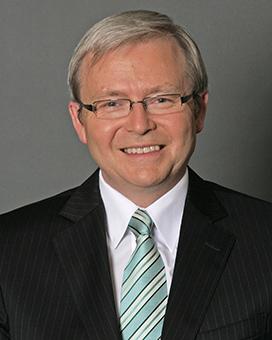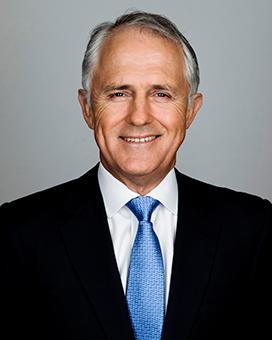On 24 June 2010, Julia Eileen Gillard was sworn in as Australia's 27th Prime Minister, the first female head of government. She chose Wayne Swan as deputy and made no immediate changes to the Ministry. The same day, Finance Minister Lindsay Tanner announced he would not contest the next federal election. Kevin Rudd moved to the government backbench.
The first 50 days
The new Prime Minister faced 2 immediate challenges – the failure of the proposed emissions trading scheme and the government's proposal for a profits tax on the largest mining companies. Both had contributed to Kevin Rudd's fall, and both remained difficult and urgent issues, with strong electoral support for the promised carbon pricing scheme and powerful industry opposition to the mining tax.
The timing of the federal election was also a key issue for the government. Tony Abbott had become Leader of the Opposition after Malcolm Turnbull lost the Liberal Party leadership ballot the previous November, and polls indicated that neither the government nor the Opposition had a strong hold on electoral support in marginal seats.
A month after taking office, Gillard announced the election would be held on 21 August 2010, putting the government in caretaker mode. A much-criticised election campaign followed, with neither major party engaging voters nor communicating vitality and direction. The outcome, with Labor winning 72 of the 150 House of Representatives seats – less than the necessary majority to govern – and the Coalition winning 73 seats, made the remaining 5 seats crucial. One of these was Lindsay Tanner's former seat of Melbourne, which became the first House of Representatives seat won by the Australian Greens.
Gillard's skills as a negotiator were fully deployed in securing the support of those holding the balance of power – the Greens' Adam Bandt and four Independents: Andrew Wilkie, Rob Oakeshott, Tony Windsor and Bob Katter. After 3 weeks of intense discussions, 4 agreed to support Labor in forming a minority government; former National Party member Bob Katter announced he would support the Coalition. (The Greens ended their formal alliance with the Labor Party in February 2013.)
Minority government
The new Ministry was sworn in by Governor-General Quentin Bryce on 14 September 2010. In her Cabinet, Gillard retained Wayne Swan as Treasurer and included Kevin Rudd as Minister for Foreign Affairs.
Gillard delayed moving into The Lodge until after the election outcome, and followed this with a series of overseas meetings. These included the Asia–Europe summit in Brussels and the 17th ASEAN summit in Hanoi in October. She went to the G20 summit meeting in Seoul 3 weeks later, and from there to a NATO meeting in Lisbon.
Australia was one of the 20 non-member nations with troops in Afghanistan taking part in the NATO meeting. The Prime Minister supported US President Barack Obama's opposition to arbitrary withdrawal deadlines. She undertook that the 1550-strong Australian force would remain if necessary after the end of 2014 target transition date to local Afghan control.
In domestic affairs, a key piece of legislation for the National Broadband Network (NBN) was passed by the Senate on 26 March 2011, after a 12-hour sitting. The intention of the NBN rollout is to provide access to high-speed broadband for all Australians regardless of where they live.
In November 2011, the Gillard government's Clean Energy bills were passed by the Senate. Under the legislation, polluting industries were made to pay $23 per tonne of carbon emissions from 1 July 2012. Households would be compensated for the extra costs through tax cuts and increased benefits.
Also in November 2011, the Gillard government's plain packaging laws for cigarettes were passed, with cigarettes to be sold in generic dark green packets. Australia was the first country to introduce plain packaging laws.
The government celebrated the passage of the controversial mining tax legislation through the Senate on 19 March 2012. The passing of the laws marked a significant milestone for Gillard, who tweeted on Twitter: 'Finally, all Australians will get a fair share of the mining boom'. The tax came into effect on 1 July 2012.
On 9 October 2012, in response to Opposition calls for speaker Peter Slipper to stand down over a series of lewd text messages, Gillard delivered what has become known as the 'misogyny speech' in Parliament. The speech attracted worldwide attention and had more than 2 million 'views' on YouTube.
On 12 November 2012, Gillard announced the creation of a national royal commission into institutional responses to child sexual abuse. The commission's scope includes religious organisations, state care providers and not-for-profit bodies, as well as the responses of child service agencies and the police to allegations and instances of abuse.
Legislation to set up the government's National Disability Insurance Scheme (NDIS) passed the House of Representatives and the Senate in March 2013. The NDIS aims to shift funding for disability away from welfare to a system based on social insurance, with all taxpayers contributing. Instead of funding being allocated to service providers, individuals would be given direct access to funding, which they could then administer either directly or through brokers. The government announced in May 2013 an increase in the Medicare levy from 1.5% to 2% to help fund the scheme, named DisabilityCare.
On 21 March 2013, Gillard apologised on behalf of the Australian Government to people affected by forced adoption or removal policies and practices.
On 26 June 2013, the Gillard government's education reform legislation (often referred to as the Gonski reforms) was passed by the Senate, on the same day Gillard lost a leadership ballot. Arising from the recommendations of a review of school funding led by David Gonski, the reforms provided 'needs-based' funding, with a benchmarked amount of funding for each student, and additional funding for disadvantaged students. In August 2013, New South Wales, the Australian Capital Territory, South Australia, Tasmania and Victoria signed up to the plan. The government announced cuts to tertiary education sector funding to help fund the school reforms.
Challenges to the leadership
Gillard's prime ministership was marked by much speculation about leadership tensions and internal conflict within the Labour Party and, in particular, the possibility of a challenge from the man she replaced as Prime Minister in 2010, Kevin Rudd.
On 22 February 2012, Rudd resigned as Foreign Minister. In response, Gillard announced a leadership ballot to be held on 27 February, in which she defeated Rudd 71 to 31.
After poor polling and continuing speculation about a challenge, on 21 March 2013 minister and former party leader Simon Crean called for a spill of leadership positions, declaring his support for Rudd and his intention to stand as deputy leader. Gillard announced a vote for that afternoon, but Rudd announced that he would not contest the leadership shortly before the ballot was to take place. Gillard and Deputy Leader Wayne Swan were unopposed in the ballot. Crean lost his role in the ministry and several other ministers resigned their positions.
Amid continued speculation in the media about her position, Gillard announced another leadership ballot on 26 June 2013 and undertook to stand down from politics if she was unsuccessful. Kevin Rudd announced his intention to stand for the leadership, and he defeated Gillard in the ballot held that day by 57 votes to 45, becoming leader of the Labor Party again.
Gillard's resignation as Prime Minister took effect the next day, and Kevin Rudd was sworn in as Australia's Prime Minister for the second time on 27 June 2013.





